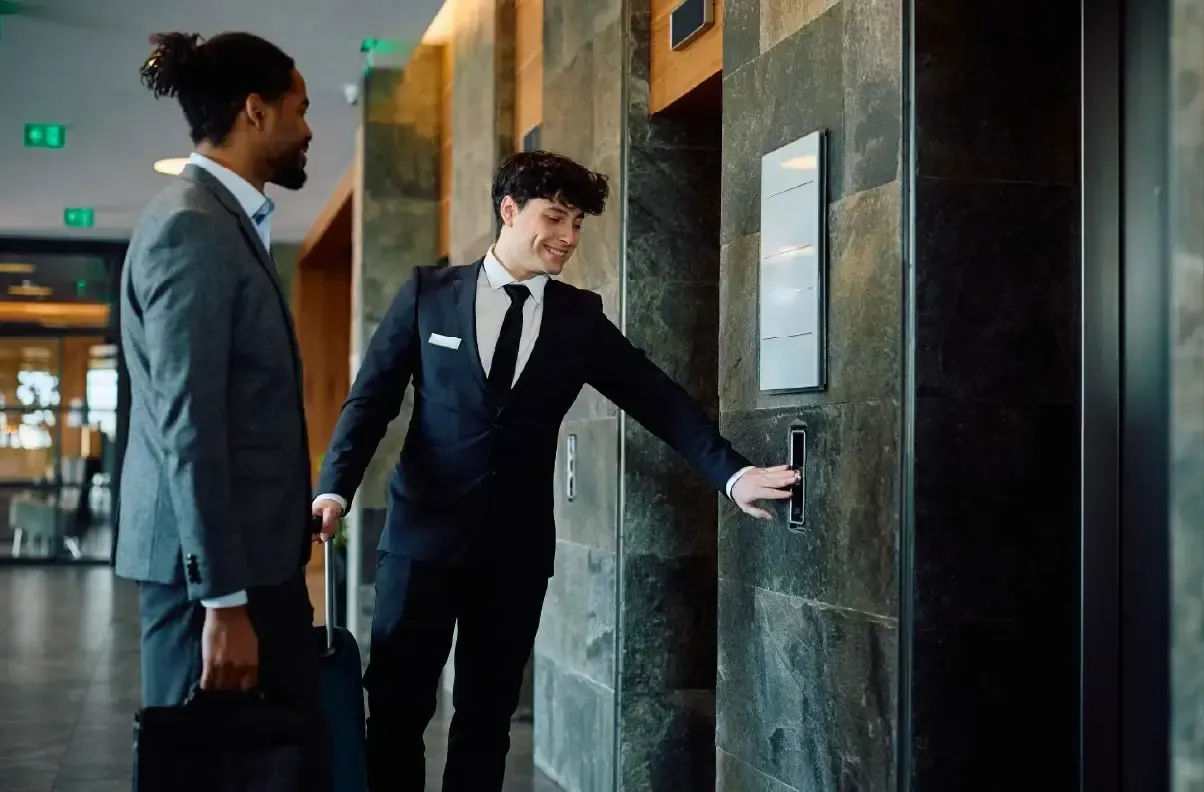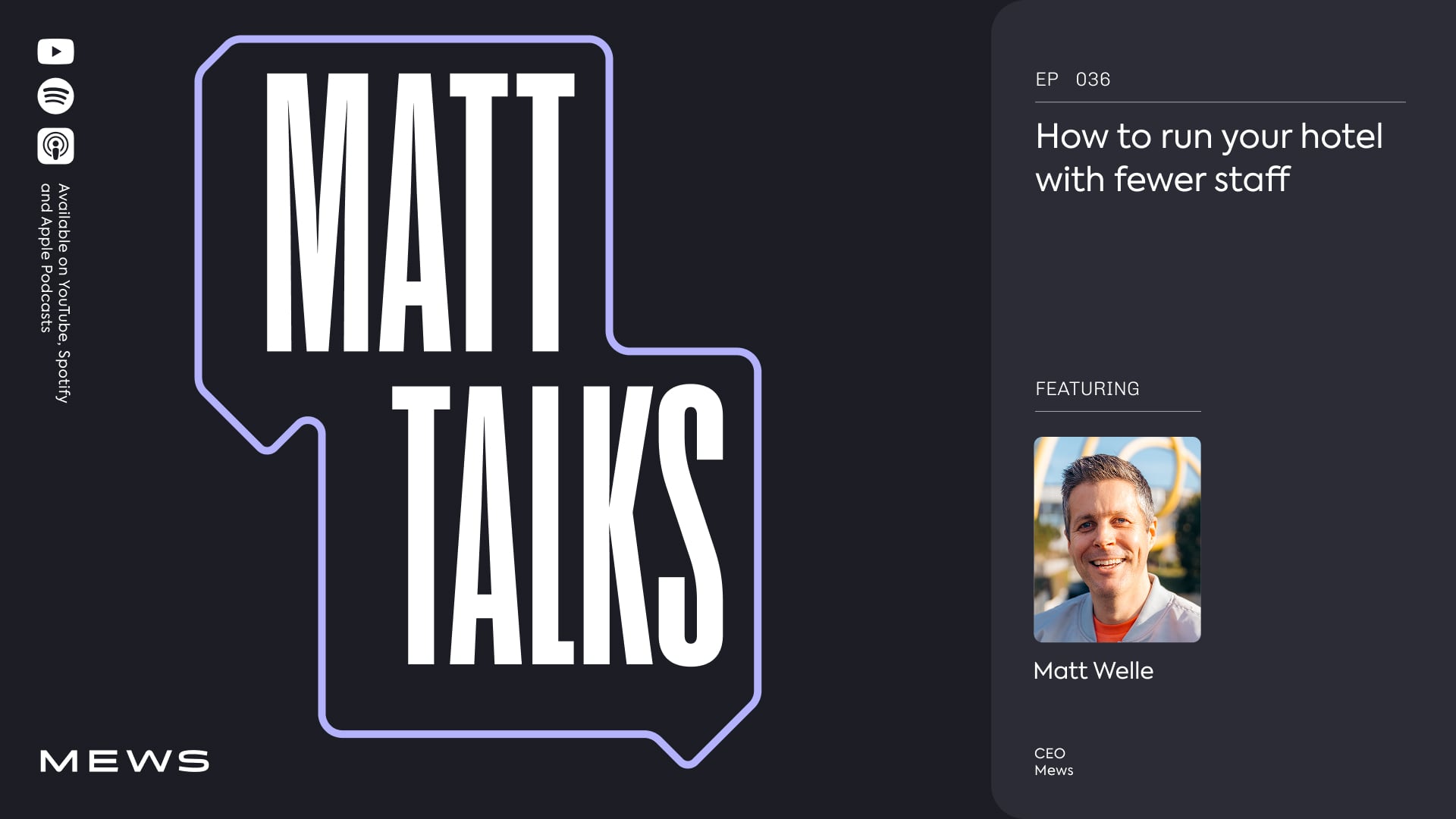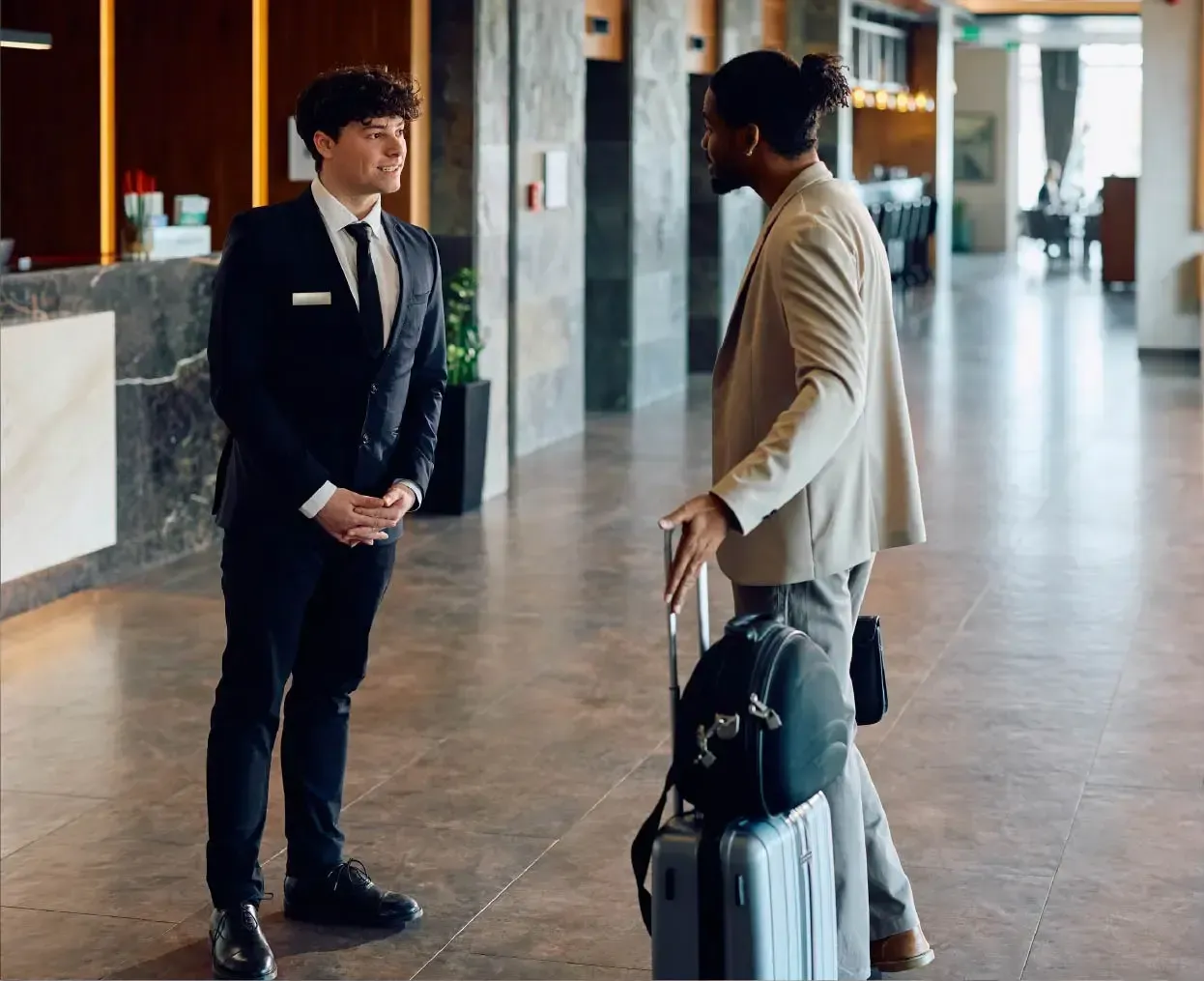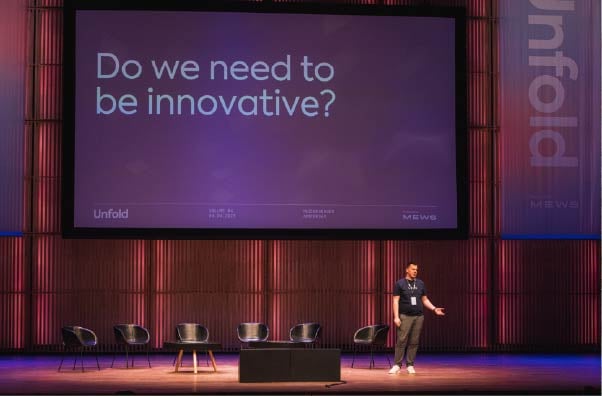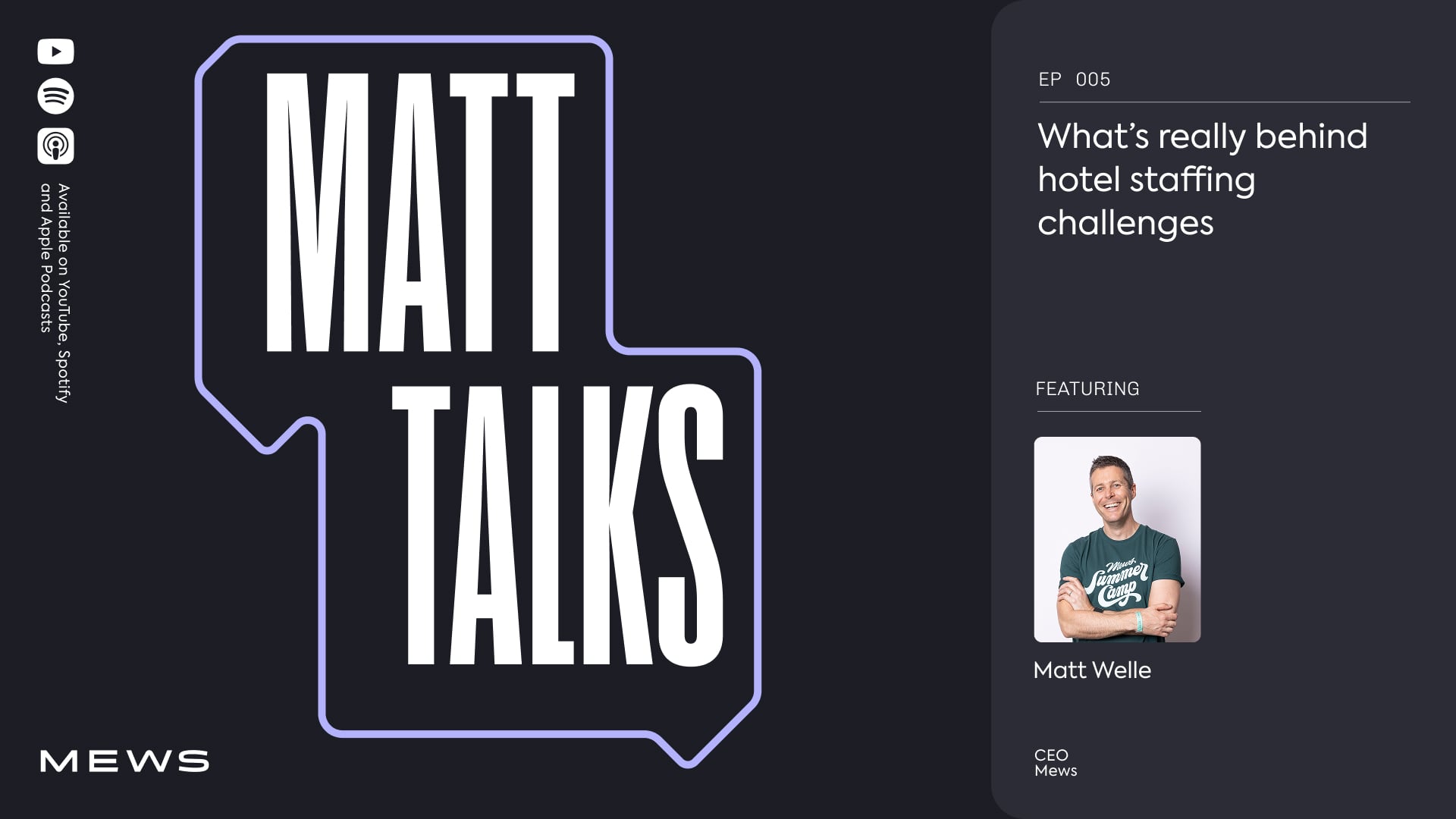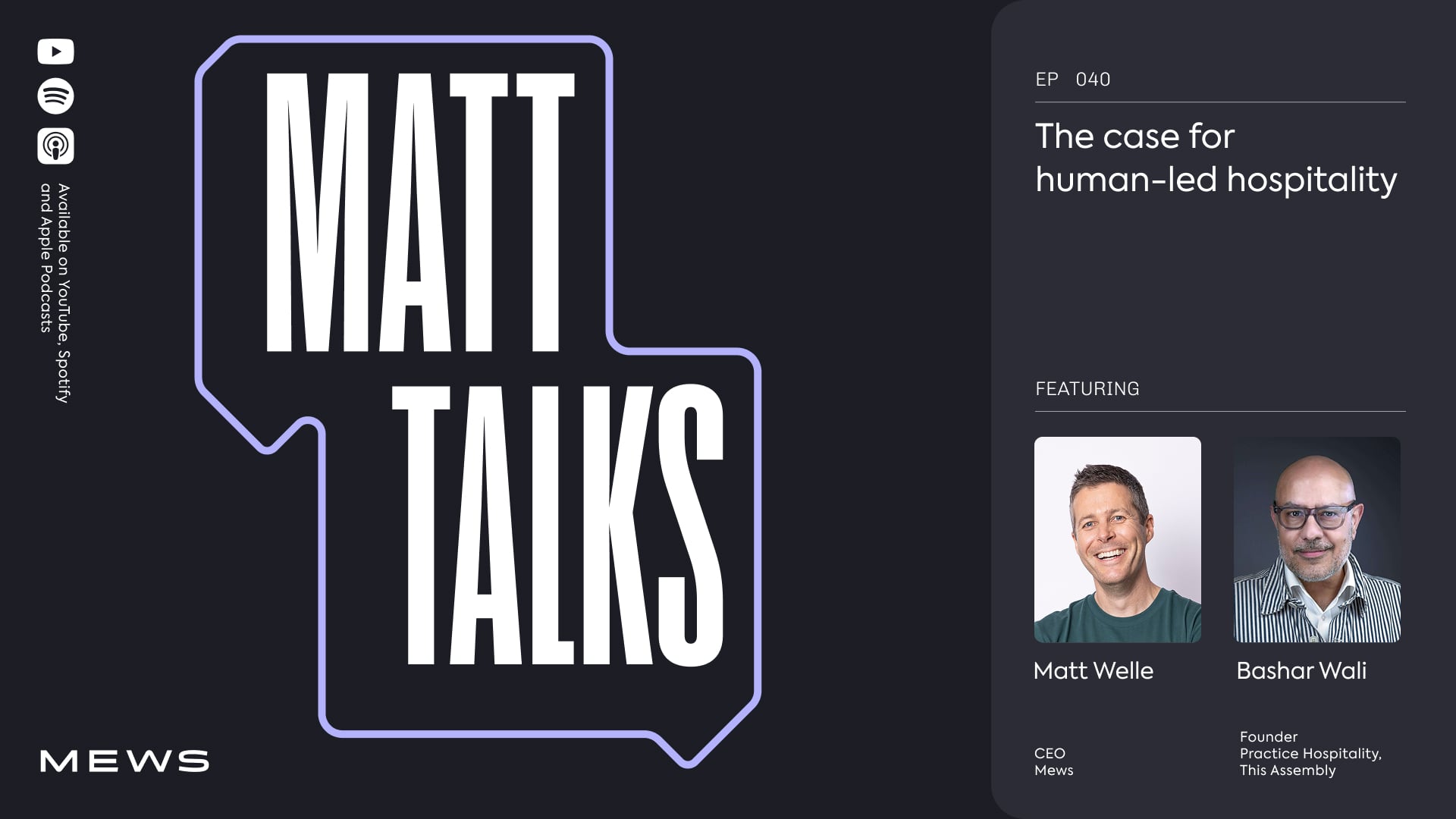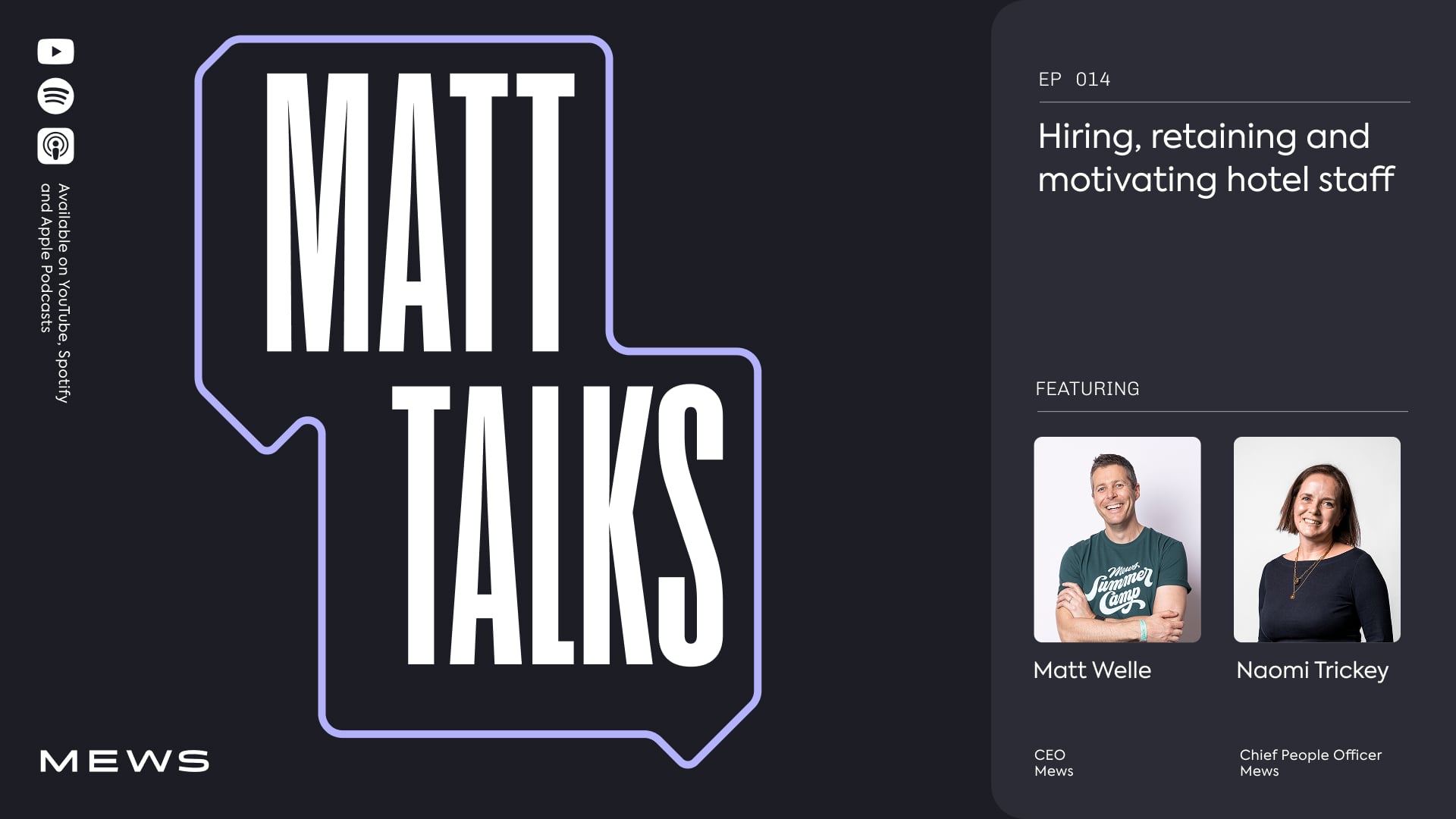What to expect?
Meet your host

Matthijs Welle
CEO, Mews
After years in the trenches of hospitality, Matt joined the Mews journey during its early days in 2013. Since then, he’s been our fearless CEO, leading the company and the industry forward.
Episode chapters
Transcript
What we're seeing in the hotel job market
Hi, everyone. Welcome back to another Matt Talk. This week, I wanted to talk about how do we run hotels with fewer staff? It's a really difficult question.
We are seeing on the one side with where the economy's at, that prices are rising, and that means that staff are getting more expensive. But also, we don't see the same amount of interest in working in hospitality as we saw a couple of years ago. And that means that salaries are increasing because of the the lower availability of talent. And that's difficult because we still have to operate the same profit margin at the bottom line.
So in order to do that, we have to run our hotels with less staff whilst we're trying to not compensate on any of the guest experience or the quality of the hotel. So today I wanted to talk about the types of applications of technology that can help supplant some of the heavy labor that goes into tasks that we can actually automate today. But a lot of hotels have not yet leaned into some of those things. I'll talk a lot about AI.
I can see
Chapter
Why hotels shouldn't hesitate to use AI
a massive impact of AI. So I've joined, I visit a lot of hotel conferences, but I also go to technology conferences. And often, there's quite a dichotomy between what I hear at a hotel conference, which isn't very advanced in terms of what's happening with AI. And then when I go to technology conferences where other industries come together to talk about applications, you can see what the future of hospitality will look like because, honestly, it is incredible how fast it's moving.
And what I often get from hoteliers that I've spoken to, they're like, yeah, we've looked at AI, and it didn't work for us. But what didn't work for you three months ago or even a year ago has very quickly accelerated. And the solutions that are available today are often better than the best human that you have. And, yes, they might not create this really personal experience, but the efficiency gains that you get so that your team members can drive a much more flexible experience are worth investigating and worth really looking into.
If you aren't running any AI experiments in your hotel, you are currently behind. We're seeing so many hotels that are, you know, starting with the light part, which is a chatbot on a site or through WhatsApp. And that's really the beginnings of what you can do with AI. But there's going to be so much more that we will see in the next couple of months coming out.
This is not a matter of years. This is a matter of months as we start to embed some of those solutions inside Mews and hotels really start to leverage the incredible efficiencies gained, and it is important that hotels prethink about this. What are we going to do when we get these massive efficiency gains? Where are we going to allocate our talent?
How will jobs change? And these jobs are already changing, still minimal, but AI has now gotten so good that we expect that in the next six months, you'll start to see dramatic changes. So I will talk through all of the different departments that we have in hotels. So we're talking through front office, back office and reservations, events, the food and beverage department.
And I'll talk through potential scenarios of where you could optimize your technology, how you could change the way that you think about some of the traditional jobs in hotels, and how can you drive efficiency so that you can operate your hotel with fewer staff. Because, ultimately, that will drive the same, if not a better profitability of your hotel, which is ultimately why we're in business. I hope you enjoy this. Right.
Chapter
How to drive front office efficiency
Let's talk about front office. Front office is the most visible department of the hotel. It's the first impression, the last impression that you leave behind. So service is really critical at the front desk.
But at the same time, it's also where the biggest pain points usually arrive. If you think about the experience that you have, you walk through the door of the hotel, and then you start scanning for the reception desk. And often, you'll first see a concierge desk, then you see a reception, and you might see some bellboys roaming around or they have their own desks as well.
And if you think about what happens throughout the day of a hotel, there are these really high peaks and troughs that happen. So from a check-in point of view, often, if you're a business hotel on a Monday at six o'clock, it gets really busy because all the businessmen and women are now finished with their corporate job, and they are now checking into the hotel. And that gets really busy, and this type of audience does not tolerate delays. At the same time, you might have a leisure hotel.
So on a Friday afternoon for the weekend trips, it gets really, really busy at, like, midday when people start arriving. And all of those guests are being told to store the luggage and come back later. And it's basically a double whammy because one time they come to the reception for that early arrival, and then they come back later on for a second interaction with your staff. If you think about checkout, same story, you get these really heavy periods.
So you have the period often right after breakfast, which is when it gets busy. So between nine and eleven, it gets really busy for the checkout period. And then you've got these real peaks that are happening. But in between the big peaks, you've got a lot of silence, and a lot of staff is not necessarily adding value.
So if you want to run the hotel with a leaner team, you'd have to make sure that the peaks and the troughs are
Chapter
A way to get rid off queueing at the reception
taken away so that the balance of work is spread throughout the day. And how do you do that? Because you can't tell guests when to arrive or when to depart. That is their choice.
But there's so much you can do with some of the modern solutions that we've introduced. So I'll talk through some of those. So the first one, obviously, is online check-in and online check-out. We have deployed online check-in and online check-out quite some time ago, years ago, and it's gotten really good.
It now does the handling of the registration card completion, the credit card completion. It does an upsell of both the room and, essentially, breakfast or any other products. And, also, there's a messaging function. So guests can actually complete the majority of that online and even get the digital key if you are using one of the digital key providers like ASSA ABLOY or SALTO.
So that takes care of you know, if you just have the standard basic setup with email confirmation and an email two days before arrival, that takes care of fully 15 percent of your guests who are checking in online. You can add-on an SMS product so that actually will, 24 hours before arrival, SMS to guests. And this one has a really high efficacy where it pushes the conversion up. It almost doubles conversion from 15 percent to 30 percent.
And that means that suddenly one in three guests no longer has to come by the reception desk. Or if you still use plastic keys, then they might only come to pick up their key. So it cuts the check-in time from five minutes to eight minutes to possibly one to two minutes, and that is significant when it's busy in the lobby. So online check-in and online check-out is a baseline experience, and it really helps take care of the majority of the kind of people that don't want to wait in a queue to get them into their rooms.
However, for those guests who have not checked in online and who might still arrive whenever they arrive, they will end up queuing at the reception desk. So we've deployed a kiosk solution. So the kiosk is one way to say, okay. I want the primary experience to be the reception.
Then you can have a backup kiosk. So you could have an area where there are some kiosks displayed, not necessarily visibly at the front line, but in a corner. So the moment it gets busy, you could have the manager on duty come out or just the trainee and guide some customers to the kiosks in addition to the reception desk. This helps remove some of the friction point there.
You could even turn the kiosks into staff mode. So you could have a trainee who you give the kiosk in staff mode. So it gives a little bit extra functionality, but they can literally check customers in from the queue without them having to reach the reception desk. And that, again, alleviates the reception desk.
That's really, if you wanted to retain the reception desk, you, I've also now seen hotels like the Zedwell Hotel in London who have 15 kiosks, and they have built them beautifully in their lobby. And they have four hosts walking around with tablets so that the primary experience is the kiosk. And then there's always an override where a human can step in. If someone doesn't like checking on the kiosk, a human can assist the kiosk experience.
So, again, kiosks help accelerate the check-in. It's really simple and fast to get people in. It is better at upselling is what we've noticed. So it also drives more revenue than a human checking people in, and it gives a lot of optionality.
You can have it as a backup. You can have it as a primary, or you can turn into staff mode so you can have additional staff that jump in when it gets busy, but you don't have to have an entirely fully staffed kind of team at all times to take care of the peaks. Another thing that is changing is that where a traditional hotel would have a concierge, a reception, and bellboys,
Chapter
How hotel job roles are changing
suddenly everything is mobile optimized. So our system runs in the cloud.
Payments are embedded, so you don't actually need a payment terminal with it. And because of that, you get flexibility. So you get to roam around. So you don't necessarily need a separate team to handle luggage and concierge because they all have their own peaks and troughs.
So you could actually combine that into a singular kind of job role, which makes the job more varied, thus more interesting, and job satisfaction goes up. And the longer people stay, the more efficient they get at that job. And it also allows you to have less peak staff that you have to put in place in order to take care of the big peaks and the troughs that you're seeing at the hotel. Another great thing that I've started seeing recently is that hotels turn the kiosk into staff mode.
And in the morning time, when breakfast is, they go into the restaurants and they just ask to guests saying, hey, can I assist you with your bill, or would you like me to send the bill to you so that you can actually just walk out? It makes the checkout experience much smoother. Usually, the restaurant has a different peak than the reception because the breakfast happens before the checkout.
And if you have a roaming employee, they could go into the restaurants in the morning. That lowers the queues potentially later in the day. And then later in the day, they can shift back to the reception. And you gain this flexibility through having, like, a remote and online system in that sense that is completely mobile optimized.
So there is so much potential already today to rethink the jobs that are existing in the front desk and to make people multipurpose, to leverage technology, to take care of the big peaks. And, you know, a lot of guests will still want to arrive at the reception desk, but nobody likes being told when they check in early to store their luggage. So work with housekeeping to make sure that you get a few rooms back early. You put an upsell charge on the kiosk so that you actually make some additional revenue from giving guests keys to their rooms early, but it avoids them having to come twice to the reception.
One to do the pre-check-in and the luggage drop, and the second time when they actually come to physically check into the room. If you can provide them that room early because you have a really strong partnership with housekeeping, you put the housekeeping department on a mobile app, this drives revenue, and it drives even more efficiency. So these are just some of the ideas that I can think of that really can transform the reception team and ensuring that you don't have to have a huge amount of staff, making sure that you can cover those big peaks and those big troughs. Let's talk about food and beverage or restaurants and bars.
Day at food and beverage starts at the breakfast shifts. Breakfast shift is often very hard to staff. It's very hard to find talent that wants to work the morning shift. But also, it's not usually the most profitable kind of service in the hotel, but it's a must-have.
So hotels give the flexibility of including breakfast or some rates don't have breakfast included. And that makes it hard because suddenly you have to now staff a hostess. So you have to have a hostess at the reception that checks breakfast, yes or no. They don't add significant value to the experience.
They ask you what your room number is. They look in a list, and they take you to a table, and it's a wasted resource in my view. Could you include breakfast for all of the breakfast in the hotel? That's a nice service.
People like breakfast, and a lot of people won't use it, but they will pay for it. So that helps drive some of the revenue. And, yes, the average rate goes up, but there's a real added benefit to the brand experience that you're creating. Everyone gets access to breakfast, and it drives revenue, but also you don't have to have a house desk at the reception.
Last week I stayed in a hotel in Scandinavia, and they had included breakfast for every guest. And it was a really nice experience. And I just walked into the restaurant, and I started, you know, walked into the buffet and took my food. And I thought, doesn't anyone wanna check?
But then I thought, no. Actually, they don't because everyone has breakfast included, and it was such a smart way to approach it. The other way you could approach this is saying no one has breakfast included, but you can buy a breakfast upgrade box, for example, or you can turn breakfast from a heavy buffet into an a la carte and a grab-and-go-bag that you want to have. Like, a lot of guests don't necessarily look for a breakfast buffet, but if it's the only option that you give them, then that's the option that they'll take.
And that's the heavy staff, where you need to man the buffets. You need to have a hostess. You need to have staff serving. And it is actually making sometimes life more complex even though we think a buffet is the easiest way to go.
Another thing to think about is how do we drive reservations for the evening? We want to make sure that when we have staff, we know in advance how many guests are likely to visit the restaurant, but also we want to stimulate reservations because that drives more revenue. And hotels often struggle to attract guests because especially if you're in a central location in town, guests will leave. However, on the day of arrival is often the best day to capture guests.
They're not yet familiar with the city, so you can entice them through digital tools. So you can work with CRM integration or chat integration partners like HiJivy or Duve or Runnr.ai. And they can engage the guest beforehand and send them a link to your reservations platform. We also have a native integration with Mews, with ResDiary, and with Zenchef, which are reservations platforms so that when you check into the reception, there's a separate screen on the reservation where you can now create table bookings.
So, actually, you can stimulate your staff to drive table bookings. The more bookings you can capture in advance, the more stability you have in a baseline kind of occupancy in the restaurants. And that allows you to really plan your staff in the best way possible. We're also leveraging
the latest S2, Stripe terminals that we've deployed in our restaurants, which are multifunctional.
So the terminal is basically a smartphone. So it can take the order. It has a great tipping screen, so we see a significant increase in tips that are being collected from it. But it is also the payment terminal.
So if you think about the experience right now when you have a guest who wants to pay, they make you go to the till, get the receipts, walk back to the table, then walk back later on to check how they wanna pay, then walk back with the payment terminal. And it's quite a disjointed experience, and all of that can be solved in one single interaction. Another great way to solve this is that when you place the order, you basically put a QR code on the table that allows guests to pay as and when they want to, and they can just walk out. And it's those really smart payment ways because that's one of those big interactions that you need staff for that requires quite some work where you can leverage automation to help increase the speed at which we turn over tables so that we can resell the table, but also you need less staff to serve these guests.
Another great way to use your food and beverage systems in a much more flexible way so that you can run a food and beverage outlet with less staff is, when you think about, for example, the lobby or pool areas or a gym, most of those areas are non-revenue generating.
But, actually, if you have staff, we should try and generate revenue. So you could incorporate menus with QR codes in those areas so that, you know, someone by the pool can just scan the QR code. And from that code, we will know which pool chair they're at. Or from the lobby, we know which table in the lobby they're sitting at.
They can order and they can pay directly from their own personal device. There's no one who needs to come in to take the order or charge the bill. The only thing that has to happen is deliver the drinks. And it's one way to drive more revenue, but also it's a way to optimize your staff having to roam around to make sure that guests are being served in those particular areas.
So these are some of the ways that I can think of where technology can really come in as a way to help optimize your food and beverage workflows. Let's talk about revenue and distribution, two really critical areas to the operation of the hotel, but also areas where some of the best technology has come in in the recent years that can help alleviate some of the work or all of the work for some of those particular roles. So, traditionally, we would have reservation desks that would take reservations by phone, by email, from travel agents, etc. Obviously, with the rise of channel managers, we have seen a huge impact of that, automation that's come in.
And we're seeing much smaller reservations teams. And some, it does matter which channel managers you're working with. So we obviously have a number of channel managers that are doing an incredible job. Some of the biggest channel managers that we work with globally are SiteMinder.
Cubilis does a really great job in the Benelux markets. D-EDGE does a fantastic job in the French market. So, usually, in each market, there is a player that does a really good job where we have a really deep, smooth integration, and you don't want to have to check reservations manually by hand. And if your team is still going reservation by reservation because something goes wrong, then that's worth looking into.
Last week, I was in London, and I walked into a branded hotel. It was not a Mews-run hotel. And I asked the reception desk, I said, what's the biggest thing you struggle with the current legacy system that you're working with? And he said, all of our Expedia bookings come in with the wrong rates, so I have to check every single Expedia booking and change the rates manually.
And I thought that is crazy that a big global brand, that hotel still has reservations pulling in from their central reservation system with incorrect pricing, and that's creating a huge bottleneck. And if you think about London and salaries in London, it's just a waste of talent that's being used. So on the distribution side, really make sure that no one is checking reservations by hand because if you are, then there are probably better solutions on the market. On the revenue management side, still the majority of hotels today don't use a revenue management system.
And that means that a human in your back office is manually setting the rates. They are probably going into a tool where they see competitor rates and they're determining what the best rate is. And they don't work 24/7 like a modern assistant would. They're working from Monday to Friday, nine to five.
So anything that happens on the weekend, those rate adjustments will only come on a Monday. And the humans are just not better than the algorithms that are available with AI today. You know, with Mews and Atomize, you can go completely on autopilot on the base rates for the hotel. Does this mean that you will not have a revenue manager?
Not in my opinion. I think the revenue manager role will change to setting rates, which is what they traditionally did. They spend a lot of time in Excel sheets crunching data and setting the rates. That part of their role will actually change towards a much more strategic role.
So a revenue manager will now actually look at the total business. They don't just look at the room rates. They look at all of the upsell products that you have. They're looking, how can we drive more revenue?
And they're looking to run tests. So they will run a test on, could we make, our parking dynamically priced so that on a Tuesday when it's busy in the hotel, could we raise the price slightly to see if there's a price resistance to it? And a modern revenue manager is much more strategic in thinking holistically about the revenue strategy, where the heavy manual work is taken over by a revenue management system like Atomize that we, have obviously acquired with Mews and are now deeply embedding within our systems so they have the smoothest integration and data flows between them. We really trust the algorithms to handle all of the reservation flows.
Those are some of the big areas, but especially in distribution and revenue management, there are phenomenal tools on the market. And if you're ever struggling with picking the tool that's right for your particular type of hotel, make sure that you reach out to our Mews team or to consultants that can help guide you because, really, most of this work can now be fully automated for hotels. Housekeeping. Another department that leans heavily on staffing, and obviously, it is very hard to clean a room without humans.
Chapter
What modern housekeeping looks like
And I think we're still probably a couple of years away before robots truly step into this role. So how do we optimize for those inefficiencies that we see in housekeeping? We have some fantastic integrations in our marketplace. Solutions like, you know, Flexkeeping is one of the best ones that I've seen recently.
You've got Optii, you've got several, a number of solutions in the marketplace that you could leverage. And some of them have already embedded AI. Recently went into a hotel and I asked the housekeeper whether they would show me Flexkeeping specifically they were using at a hotel here in Amsterdam. And they spent two hours just showing me how smart it was at optimizing the allocation lists.
Right? The way I talked earlier about the Kiosk, if you had rooms available, you could sell them for an additional upsell fee. But, unfortunately, often, the housekeeper focuses on the wrong rooms in the morning. You can set an algorithm where it can smartly allocate rooms that have, you know, that should be ready for arrival, and you can tell it how to optimize for those particular allocations that you can drive more revenue, but also it helps alleviate the queues at the reception desk.
So a really tight partnership between housekeeping and front desk in the way that they're leveraging technology is really important. Mews also has its own housekeeping app. So a housekeeper can operate with their own smartphone, and that smartphone has a native app on it so that they can natively see which rooms need to get cleaned. They can see the notes of the arrival guests so they can see if there needs to be an extra bed or crib set up in that particular room, and then they can inspect it directly from their phone.
What I see most in hotels, and there's this great report in use called the activity report, and you can run it to see when rooms are getting cleaned and inspected.
Usually, this is between two and three o'clock, which means it's time when housekeepers go home. And what they've done is all day, they've written their clean room numbers on a piece of paper. And only when they leave, do they give it back to the reception desk? And this is why guests are often being told to come back at three o'clock because there's no strong connection between housekeeping and front desk.
And with a strong connection, I'm not talking about walkie-talkies, which is what we used to do, and I still see hotels do this. It means tech-enabled. They should know which room should be cleaned first. And, you know, the Mews housekeeping app is lean but mighty.
But then you can really build on that with a solution like a flex keeping that can do a lot of the reshuffling of shifts based on what's happening throughout the day, and that's really important. We have a great partner, for example, Hotels for Trees, where you can put a door hanger on your door or even during the online check-in, you can say, I actually don't want my room to be cleaned, and I'd like the hotel to donate five euros to a charity. And, yes, there's the cost of the five euros. But if you think about what it costs to clean the room, it's often more than five euros.
So it makes it easier because the labor expectation goes down if more guests opt for this Hotels for Trees option. But also we're doing the right thing, and it's a really great CSR effort that
Chapter
Why hotels no longer need minibars
you have. We've seen more and more hotels remove minibars. Minibars is one of those things that takes either a full time staff member to go around the rooms and refill the minibars, or it's the housekeeper who has to do this.
And that, again, increases work. And, usually, minibars are loss-making. Instead, what we see more and more is that housekeepers will stock the minibar with two bottles of water and then there will be a shop downstairs. Or I was staying in another fabulous hotel in London the other week that had a really nice kind of, vending machine in the corridors and not your typical, like, student dorm vending machine, a beautifully designed vending machine on the corridors that had a really wide selection that didn't just have the basic selection of waters and cokes.
It had really nice niche kind of products that made me almost want to kind of buy lots of products from it because it was so beautifully done. So not having minibars doesn't mean that the experience has to be worse. You could invest into really great technology. There's a great partner, Wundermart, that sits in hotel lobbies where you've got a lobby kiosk basically where customers can pick up their products and pay for it there and then.
And those solutions make sure that you don't have to hire staff that support the room service, etc.
And the last category of innovation really comes in a new category almost that has developed in the last few years, which is like guest communications, where, traditionally, guest communications were mostly central reservations. So people would call to make reservations. Now you're seeing customers using WhatsApp, Messenger, and SMS to communicate with the hotel in addition to email and phone. And they become centralized communication centers that help solve all these things.
And this is the area where huge innovation is right now happening. And I've seen such incredible applications outside of hospitality where AI can step in, and AI is honestly better than the humans that I've already seen. So you could call a hotel, and you can create a booking. It can recognize you.
It can send you a payment link for your booking. You can book a table reservation. You can answer any question from the hotel. And this tool has all the answers.
It's not a human that needs to get trained. And not only can it do phone, it can also start to do email responses and chat responses. And you've got partners like Runnr.ai that are pure WhatsApp and digital partners, but But then you've got HiJiffy that can be omnichannel. So if you're really looking for a solution that can cover multiple channels, then you can leverage several different partners in the marketplace.
But this is probably one of those areas where you have to invest because guests will want to communicate with their personal phone. I noticed myself that when I check into a hotel, I don't want to get in the elevator, go down to the reception to ask them about, you know, what time the opening times are for the gym. So I actually go to ChatGPT and ask it, and it's pretty good. But sometimes it's easier to just have a direct channel with the reception.
And when I ask a question, I expect an answer within seconds because that's generally how fast technology is. So if it's human-assisted, if the question gets difficult, yeah, I should be able to hand over to the human. But if the first line of defense is the human, then this is where delays come in. And where sometimes it takes hotels to respond two to three hours.
And for some queries, that might be okay. But for the majority of queries, these customers have a really high expectation of how fast you're responding, and they will prefer to be served by a really smart, friendly AI than wait for two hours to get served by a human. And this is a mindset that I think is shifting now in hospitality. AI is honestly so good.
It can consume as much information as you give it, and then it can surface it at the right moments to the right guests in the right way with the right tone of voice. And this is where you'll see a real shift happening in the next couple of months. And if you currently have a service center or a central reservations department that employs quite some humans, this is really where to think first about leveraging AI and modern solutions and really go out to market and see what's available today. And make sure that you don't lock yourself into a long-term contract because this is moving at such an incredible pace that you might want to change that within a year again.
So keep your eyes open. Every couple of months, the AI technology gets significantly better, and we will continue to see several shifts in this particular area. But honestly, just try it out. It is incredible what I've seen on the market today.
Chapter
Why less staff doesn't mean less service
Lastly, if you're looking to run a hotel with fewer staff, don't just cut back on service. Ultimately, it should lead to the same level of service, if not better, with happier staff members. And this is a really strange, that caught me, because a lot of people here run a hotel with fewer staff saying, okay. So more pressure on the existing staff members.
But that is not what I'm saying. I'm saying, let's optimize the way that we work with the staff members that we have, make their jobs more fulfilling because they get more roles, and, hopefully, drive more revenue and happier guests. So that sounds far fetched, but actually it isn't. If you think that a staff member who traditionally would just check in, check out, check in, check out, check in, check out, it is very draining, and we're seeing a huge amount of turnover in a reception desk.
And if you suddenly make that job flexible so they can take on some more duties from the concierge, because those are fun, you know, booking restaurants or stepping into the restaurant for a couple hours when it's rush hour there. That makes a job much more fulfilling. People get to float across different departments. They get more responsibilities.
They learn more skills, and they will stay longer because they actually enjoy their job significantly more because they're being upskilled and they're learning. Also, it is really important that we keep investing in training of team members. Training is really critical so that you can use them in a multipurpose way across different departments and silos. Leverage technology.
I still see so few hotels that have more than six integrations, and that's a really low number. And I think, historically, we've been trained to say, technology is expensive, so we will just hire some staff members. But often, the incredible impact that technology can have is actually driving significantly further optimization of the staffing, and you wanna get rid of the peaks and the troughs. And technology does this.
It helps drive pre-arrival work. It helps get more bookings on the books in advance so that you can do easier forecast. So technology should help alleviate some of the pain that you're feeling. Ultimately, track whether service is worsening and your employee satisfaction is worsening.
And you can only track that if you have a baseline saying, okay, this is where we're at today. These are the satisfaction levels. This is the profitability that we're running, and these are the employee satisfaction levels. And I'm having a goal that for all those, I want to increase them.
So let's keep tracking and come back to this regularly as you start to experiments, deploy technologies, and don't sign yourself into long term contracts so that you get the flexibility because AI is moving at an incredible pace, and you wanna keep your flexibility so that you can very quickly shift between platforms and just try things out. Just doing things because we've always done them is just not the best way to continue operating as a hotel. And in this day and age, when technology shifts really fast, hotels are under an incredible amount of strain because the costs are increasing, and there's pressure on revenue because the macro climate is difficult.
You have to retain your nimbleness and your flexibility, and that is what technology does. And keeping a small core team that is highly trained is more important than having a really big team that is not very well trained, that are in very specialized functions. I hope you got something out of this. I always enjoy talking through these challenges because I see so many hotels and some of the experiences that they have.
And I think it's really smart how hotels are leveraging technology in the smartest way possible. Thank you for your attention.



